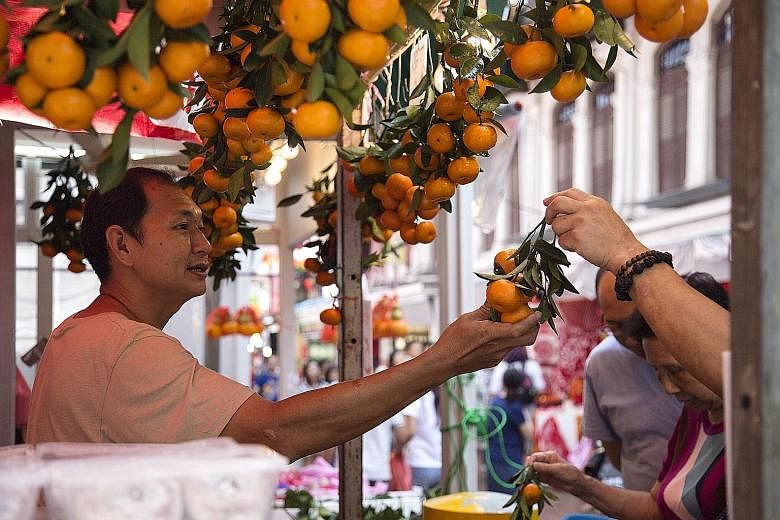Singapore's headline inflation picked up last month but stayed muted, after having been flat the month before.
The consumer price index - the main measure of inflation - rose 0.5 per cent in February compared with the same month a year ago, said the Department of Statistics yesterday.
This was comparable with economists' estimates of a 0.4 per cent increase.
A smaller decline in accommodation costs, along with a stronger pickup in food and services prices, more than offset a decline in private road transport inflation.
Core inflation, which excludes the cost of accommodation and private road transport for a better gauge of everyday expenses, was 1.7 per cent last month, up from 1.4 per cent in January. This indicator is a key consideration for the Monetary Authority of Singapore's (MAS) monetary policy moves.
United Overseas Bank economist Francis Tan noted that core inflation is at a 40-month high, saying it could be due to the Chinese New Year effect as the festival fell in February this year but in January last year. He added, however, that he did not expect it to spike much higher, nor to deviate from its 2018 forecast of 1.5 per cent on average.
Still, as current and expected core inflation is "a notch higher" than the 0.7 per cent year-on-year average in the 2015-to-2016 period, he expects the MAS to start on a policy normalisation path in its upcoming meeting next month.

Accommodation costs fell 3.6 per cent last month, milder than January's 5.3 per cent fall, which had been due to service and conservancy charge rebates.
Private road transport inflation continued to moderate to 0.6 per cent, down from 1.6 per cent the month before. This was largely due to a smaller increase in petrol prices, as well as lower Electronic Road Pricing charges.
Services inflation increased to 1.9 per cent last month from 1.3 per cent in January, as a rise in airfares and holiday expenses - following January's year-on-year decline - more than offset a smaller rise in recreational and cultural services fees.
Food inflation was 1.5 per cent last month, up from 1.1 per cent in January. This reflected a larger increase in the prices of non-cooked food items and - to a lesser extent - the cost of prepared meals, due to the seasonal uptick in food prices associated with Chinese New Year.
Looking ahead, imported inflation is likely to rise mildly as global demand improves amid ample supply in key commodity markets, said the MAS and the Ministry of Trade and Industry (MTI) in a joint statement.
Global oil prices are expected to rise only slightly this year compared with 2017, they said. Global food commodity prices are also tipped to rise modestly, even as localised supply shocks could cause domestic food price fluctuations.
Overall, cost pressures in the economy should remain relatively restrained, said the MAS and MTI.
Although labour market conditions have improved recently, the gradual absorption of previously accumulated slack will temper wage pressures in the near term. Non-labour costs such as retail rentals remain subdued.
Core inflation is expected to stay in the 1 per cent to 2 per cent range this year, having averaged 1.5 per cent last year. Headline inflation, which was 0.6 per cent last year , is projected to range from zero per cent to 1 per cent this year.


